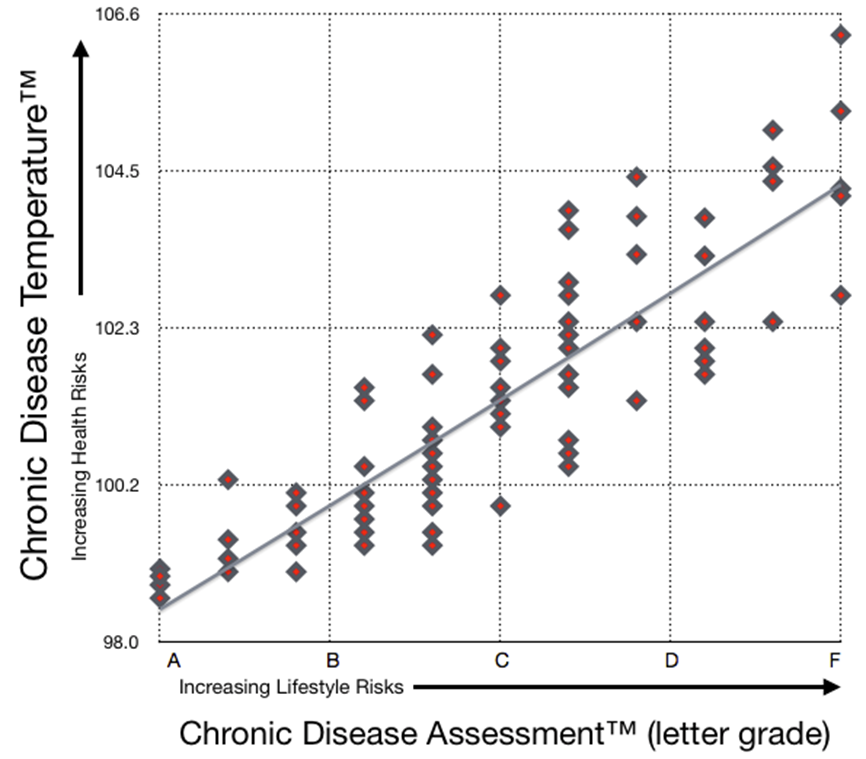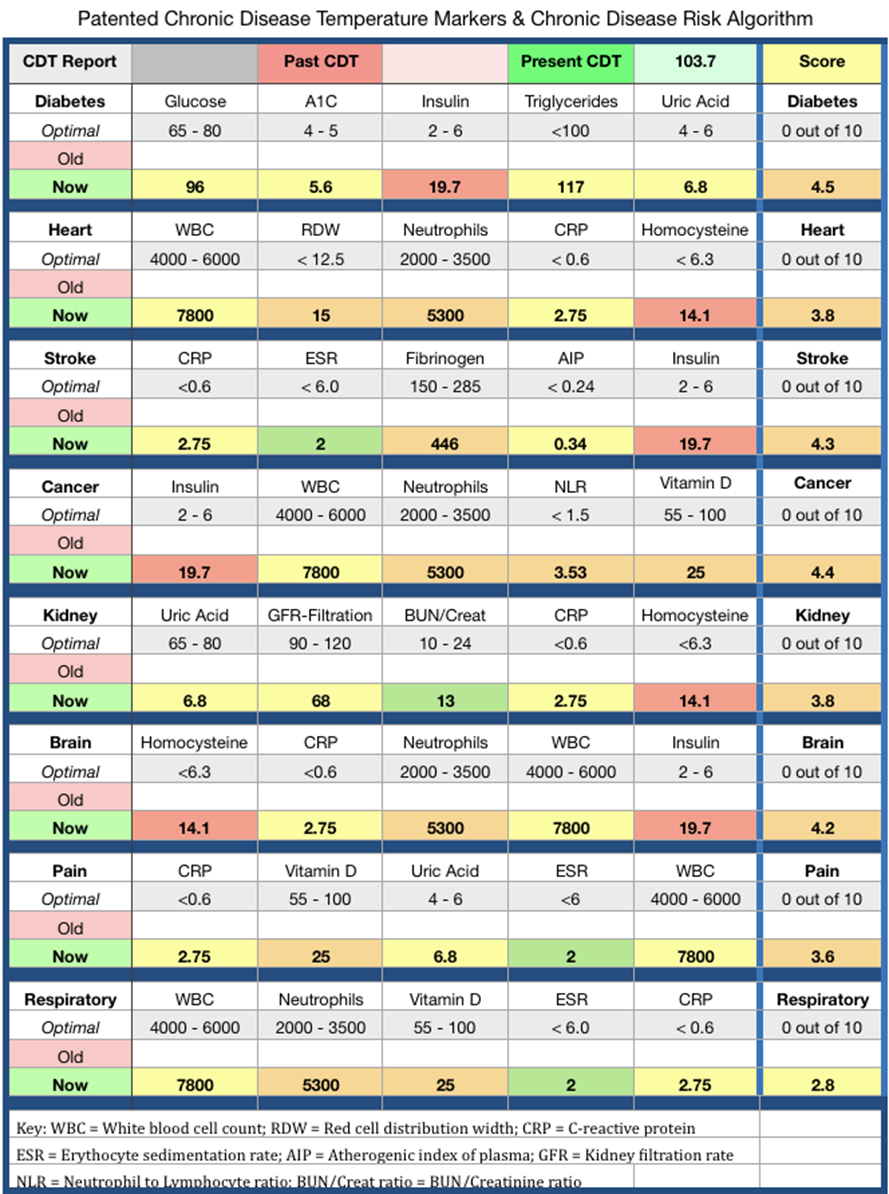MEDICUS EARLY DETECTION TEST FOR CHRONIC DISEASES
Chronic Disease Temperature Test
The MEDICUS Early Detection Test for Chronic Diseases (MEDTfCD) accurately and precisely measures an individual's health status across a continuum. It is a three level test that accesses your current chronic health and your future risk of developing chronic disease, including cancer, heart disease, diabetes and Alzheimer's in the next 3 to 10 years.
The origin of the MEDICUS Early Detection Test is a culmination of extensive clinical work at Harvard Medical School under the direction of Drs. Clement L. Trempe and Kilmer McCully who have a combined 100 years of clinical experience. The algorithms were developed by a medical scientific team led my an MIT Ph.D., Dr. Thomas J. Lewis, leveraging technology developed by Harvard Nobel Laureate Dr. E.J. Corey who created retro-synthetic analysis.
The elegant, yet simple, thesis is that human behaviors usher physiological, then pathological changes as chronic disease develops. The chart below shows the strong correlation between behavioral attributes and concomitant changes in blood biomarkers.
1. Behavior Analysis: The Chronic Disease Assessment (CDA)™ is a human behavior & lifestyle risk assessment that incorporates disease mechanism logic to create risk rating scores. The assessment is performed on-line and includes 112 questions on a secure, encrypted HIPAA compliant environment. The output is a series of data a reports that details the status of an individual on the health and disease risk continuum. It also is the basis for an individualized P4 (Preventative, Predictive, Personalized and Participatory) health revival plan.

2. Physiology Analysis: The Chronic Disease Temperature (CDT)™ is the only blood biomarker screening of it's kind. It includes both common and uncommon markers of inflammation, stealth infection, immune system status and disease. In addition, our Harvard and MIT team have performed statistical analysis on over 10MM medical research papers to determine "normal" and "abnormal" values for each marker with respect to chronic disease and risk. Our system includes artificial intelligence and "concise" big data to iteratively optimize the correlation between behavior risks and biomarker values based on real human data.
The US National Institutes of Health convened a workshop on disease-promoting chronic inflammation to identify the challenges and needs in the development of clinically feasible strategies for monitoring a person's inflammation status before, during and after disease occurrence. The CDT algorithm fulfills and exceeds the plan design of the NIH.
See Exhibit A for a sample physiology / chronic disease report.
3. Pathology Analysis: The "Window to Health" is a screening assessment that uses eye pathologies as biomarkers for active chronic disease. Sixteen global studies spanning 30 years reach the same conclusion - eye diseases are deadly systemic inflammatory diseases. Age related eye diseases including cataracts, macular degeneration and glaucoma are warning signs of poor health and prognosis. People with cataracts die at 10 times the rate compared to breast and prostate cancer suffers when compared over a 6 year period - and the cause of death is usually vascular. Some of the most prevalent human degenerative diseases appear as a result of the misfolding and aggregation of proteins. Compelling evidence suggest that misfolded protein aggregates play an important role in cell dysfunction and tissue damage, leading to the disease. Prion protein (Prion diseases), amyloid-beta (Alzheimer's disease), alpha-synuclein (Parkinson's disease), Huntington (Huntington's disease), serum amyloid A (AA amyloidosis) and islet amyloid polypeptide (Type 2 Diabetes) are some of the proteins that trigger disease when they get misfolded. Heart disease is now known to be a disease of proteotoxicity. The eye, with easy access to both vascular and neurological tissue in the ideal place to assess protein aggregation.
Para-inflammation, as measured with the CDT, is an important feature of eye pathologies when blood biomarkers are assess, is defined as a condition of tissue adaptive response to noxious stress or malfunction, and it has features which are considered as intermediate between normal/basal and inflammatory/acute states. Although the physiological purposes of normal para-inflammation are to preserve tissues homeostasis and to restore their functionality, when a tissue is exposed to stress and/or malfunction for a prolonged period, it is implicated in both initiation and progression of many human age related disorders. Eye exams, that are low cost, non-invasive and easily obtained offer a convenient way to screen for chronic disease status and risk.
The Physicians of MEDICUS Health & Vitality Clinics will prescribe the test for you. Blood can be drawn at any LabCorp office and the eye exam will be coordinated through our optometric network with locations across the globe. The cost of the test, including interpretation of the results during a one hour consultation is $1,200. Health Insurance will cover the test, however please check with your insurance carrier regarding a possible copay.
Exhibit A: Below is an example report of individual CDT labs and how they measure and predict specific diseases. Importantly, our team has the experience to articulate the complete story of chronic health and disease that the aggregation of the CDT biomarker comprising tells.

The origin of the MEDICUS Early Detection Test is a culmination of extensive clinical work at Harvard Medical School under the direction of Drs. Clement L. Trempe and Kilmer McCully who have a combined 100 years of clinical experience. The algorithms were developed by a medical scientific team led my an MIT Ph.D., Dr. Thomas J. Lewis, leveraging technology developed by Harvard Nobel Laureate Dr. E.J. Corey who created retro-synthetic analysis.
The elegant, yet simple, thesis is that human behaviors usher physiological, then pathological changes as chronic disease develops. The chart below shows the strong correlation between behavioral attributes and concomitant changes in blood biomarkers.
1. Behavior Analysis: The Chronic Disease Assessment (CDA)™ is a human behavior & lifestyle risk assessment that incorporates disease mechanism logic to create risk rating scores. The assessment is performed on-line and includes 112 questions on a secure, encrypted HIPAA compliant environment. The output is a series of data a reports that details the status of an individual on the health and disease risk continuum. It also is the basis for an individualized P4 (Preventative, Predictive, Personalized and Participatory) health revival plan.

2. Physiology Analysis: The Chronic Disease Temperature (CDT)™ is the only blood biomarker screening of it's kind. It includes both common and uncommon markers of inflammation, stealth infection, immune system status and disease. In addition, our Harvard and MIT team have performed statistical analysis on over 10MM medical research papers to determine "normal" and "abnormal" values for each marker with respect to chronic disease and risk. Our system includes artificial intelligence and "concise" big data to iteratively optimize the correlation between behavior risks and biomarker values based on real human data.
The US National Institutes of Health convened a workshop on disease-promoting chronic inflammation to identify the challenges and needs in the development of clinically feasible strategies for monitoring a person's inflammation status before, during and after disease occurrence. The CDT algorithm fulfills and exceeds the plan design of the NIH.
See Exhibit A for a sample physiology / chronic disease report.
3. Pathology Analysis: The "Window to Health" is a screening assessment that uses eye pathologies as biomarkers for active chronic disease. Sixteen global studies spanning 30 years reach the same conclusion - eye diseases are deadly systemic inflammatory diseases. Age related eye diseases including cataracts, macular degeneration and glaucoma are warning signs of poor health and prognosis. People with cataracts die at 10 times the rate compared to breast and prostate cancer suffers when compared over a 6 year period - and the cause of death is usually vascular. Some of the most prevalent human degenerative diseases appear as a result of the misfolding and aggregation of proteins. Compelling evidence suggest that misfolded protein aggregates play an important role in cell dysfunction and tissue damage, leading to the disease. Prion protein (Prion diseases), amyloid-beta (Alzheimer's disease), alpha-synuclein (Parkinson's disease), Huntington (Huntington's disease), serum amyloid A (AA amyloidosis) and islet amyloid polypeptide (Type 2 Diabetes) are some of the proteins that trigger disease when they get misfolded. Heart disease is now known to be a disease of proteotoxicity. The eye, with easy access to both vascular and neurological tissue in the ideal place to assess protein aggregation.
Para-inflammation, as measured with the CDT, is an important feature of eye pathologies when blood biomarkers are assess, is defined as a condition of tissue adaptive response to noxious stress or malfunction, and it has features which are considered as intermediate between normal/basal and inflammatory/acute states. Although the physiological purposes of normal para-inflammation are to preserve tissues homeostasis and to restore their functionality, when a tissue is exposed to stress and/or malfunction for a prolonged period, it is implicated in both initiation and progression of many human age related disorders. Eye exams, that are low cost, non-invasive and easily obtained offer a convenient way to screen for chronic disease status and risk.
The Physicians of MEDICUS Health & Vitality Clinics will prescribe the test for you. Blood can be drawn at any LabCorp office and the eye exam will be coordinated through our optometric network with locations across the globe. The cost of the test, including interpretation of the results during a one hour consultation is $1,200. Health Insurance will cover the test, however please check with your insurance carrier regarding a possible copay.
TO ORDER THE MEDICUS EARLY DETECTION FOR CHRONIC DISEASES TEST PLEASE CLICK HERE.
Exhibit A: Below is an example report of individual CDT labs and how they measure and predict specific diseases. Importantly, our team has the experience to articulate the complete story of chronic health and disease that the aggregation of the CDT biomarker comprising tells.
